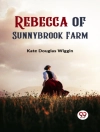In ‘The Last Asset, ‘ Edith Wharton crafts a nuanced exploration of wealth, moral deterioration, and the complexities of human relationships against the backdrop of early 20th-century American society. Through incisive dialogue and a rich narrative style, Wharton delves into the lives of her characters, highlighting the interplay between financial interest and personal ethics. The novella stands out within Wharton’s oeuvre as it encapsulates her keen observations on social stratification and the consequences of materialism, while also reflecting prevalent literary movements of her time that emphasized psychological depth and realism. Edith Wharton (1862-1937), the first woman to win the Pulitzer Prize in Literature, was deeply influenced by her own experiences in high society and her advocacy for women’s rights. Having faced the confines of elite social expectations, Wharton turned her literary lens toward critiquing those very structures. ‘The Last Asset’ not only showcases her talent for character development but also serves as a commentary on the moral dilemmas faced by individuals drawn into the labyrinth of affluence and expectations. Readers of Wharton’s work will find ‘The Last Asset’ an essential addition to the canon of American literature. Its exploration of the often unspoken dynamics of wealth and morality remains profoundly relevant today, making it a poignant and thought-provoking read for anyone interested in the social intricacies of human relations.
关于作者
Edith Wharton, an eminent figure in American literature, was born into a wealthy New York family on January 24, 1862. Her experiences in the upper echelons of society greatly influenced her writing, allowing her to offer a critical perspective on the social mores of her time. Educated privately at home and fluent in several European languages, Wharton began writing poems and short stories early in her youth, reflecting a prodigious literary talent that would establish her as a prominent author. Wharton’s storytelling was marked by her keen sense of character and incisive social commentary, set against the backdrop of the Gilded Age. Her 1905 novel ‘The House of Mirth’ brought her critical acclaim, and she was awarded the Pulitzer Prize for her 1920 novel ‘The Age of Innocence’, making her the first woman to receive this prestigious award. ‘The Last Asset’, while perhaps lesser-known, is another demonstration of her literary prowess, underlining themes of social status and personal morality within the framework of a society novella. Wharton’s writing style, characterized by its eloquence, vivid description, and psychological depth, offered a piercing look into the New York aristocracy and the complexities of the human condition. She published more than 40 books in her lifetime, including novels, short story collections, poetry, and non-fiction, solidifying her legacy as a leading voice in 20th-century American literature. Wharton passed away on August 11, 1937, but her work continues to be studied and admired for its enduring literary significance.












